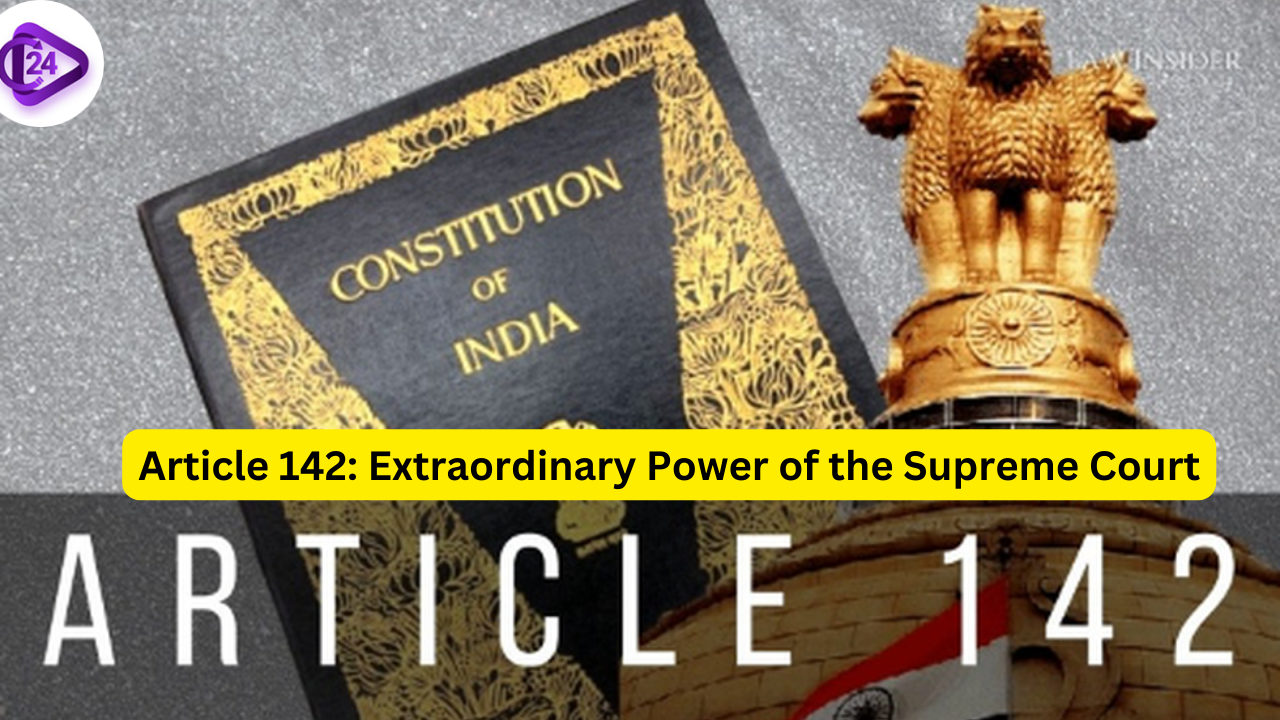Article 142: Extraordinary Power of the Supreme Court

In February 2024, the Supreme Court of India, under the leadership of the Chief Justice of India, D Y Chandrachud, invoked Article 142 of the Indian Constitution. While hearing the case, concerning the mayor election in Chandigarh, the bench comprising Chief Justice of India D Y Chandrachud, Justices J B Pardiwala and Manoj Misra has invoked Article 142 of the Indian Constitution, to do complete justice to ensure that the process of electoral democracy. Let's learn Article 142: Extraordinary Power of the Supreme Court.
What is Article 142?
-
The Indian Constitution has given an extraordinary power to the Supreme Court of India under Article 142, to do 'complete justice' between the parties, where, at times, the law or statute may not provide a remedy.
-
In those situations, the court can extend itself to end a dispute in a manner that would fit the facts of the case.
How have courts exercised this power?
-
The apex court has defined its scope and extent through its judgments over time, under Article 142.
-
Prem Chand Garg case:
-
The majority opinion demarcated the contours for exercising the powers of the Supreme Court under Article 142(1) by saying that an order to do complete justice between the parties.
-
Under this article, the court must not only be consistent with the fundamental rights guaranteed by the Constitution, but it cannot even be inconsistent with the substantive provisions of the relevant statutory laws, referring to laws made by Parliament.
-
The seven-judge bench in ‘Antulay’ upheld the 1962 ruling in ‘Prem Chand Garg.’
-
-
Bhopal gas tragedy:
-
Notably, in the Bhopal gas tragedy case (‘Union Carbide Corporation vs Union of India’), the SC in 1991 ordered UCC to pay $470 million in compensation for the victims of the tragedy.
-
In doing so, the Bench highlighted that it found it necessary to set at rest certain misconceptions in the arguments touching the scope of the powers of this Court under Article 142(1) of the Constitution.
-
The court clarified that the prohibitions on limitations on provisions contained in ordinary laws cannot, ipso facto, act as prohibitions or limitations on the constitutional powers under Article 142.
-
What is the criticism of Article 142 and how have courts countered it?
-
The sweeping nature of these powers has invited the criticism that they are arbitrary and ambiguous.
-
It is further argued that the court then has wide discretion, and this allows the possibility of its arbitrary exercise or misuse due to the absence of a standard definition for the term “complete justice”.
-
Defining “complete justice” is a subjective exercise that differs in its interpretation from case to case.
-
In 1998, the apex court in ‘Supreme Court Bar Association vs Union of India’ held that the powers under Article 142 are supplementary and could not be used to supplant or override a substantive law and “build a new edifice where none existed earlier”.
-
In its 2006 ruling in A. Jideranath vs Jubilee Hills Co-op House Building Society, the Supreme Court discussed the scope of the power here, holding that in its exercise no injustice should be caused to a person not party to the case.
-
Another criticism of the powers under Article 142 is that unlike the legislature and the executive, the judiciary cannot be held accountable for its actions.
-
The power has been criticised on grounds of the separation of powers doctrine, which says that the judiciary should not venture into areas of lawmaking and that it would invite the possibility of judicial overreach.
-
Additionally, the apex court has imposed checks on its own power under Article 142.
-
In 2006, the apex court ruling by a five-judge Bench in ‘State of Karnataka vs Umadevi’ also clarified that “complete justice” under Article 142 means justice according to law and not sympathy.
-
While holding that it will not grant a relief that would amount to perpetuating an illegality encroaching into the legislative domain.
Frequently Asked Questions about Article 142: Extraordinary Power of the Supreme Court
1. What is Article 142 of the Indian Constitution?
- Article 142 grants extraordinary powers to the Supreme Court of India. It allows the Supreme Court to pass any decree or order necessary for doing complete justice in any cause or matter pending before it.
2. What is the purpose of Article 142?
- The primary purpose of Article 142 is to empower the Supreme Court to provide complete justice in cases where existing laws may be inadequate or where there is a need for innovative solutions to ensure justice.
3. How does Article 142 empower the Supreme Court?
- Article 142 empowers the Supreme Court to pass orders or decrees that are necessary to do complete justice in any case or matter pending before it, even if such orders or decrees may go beyond the scope of existing laws.
4. Can the Supreme Court use Article 142 in any case?
- While Article 142 provides the Supreme Court with broad powers, it is typically invoked in exceptional circumstances where traditional legal remedies may not be sufficient to achieve justice.
5. What are some examples of cases where Article 142 has been invoked?
- Article 142 has been invoked in various cases, including environmental matters, land acquisition disputes, public interest litigations, and cases involving issues of national importance where traditional legal remedies were deemed insufficient.
6. Are there any limitations to the exercise of power under Article 142?
- Yes, while Article 142 grants extensive powers to the Supreme Court, these powers are not unlimited. The Supreme Court must exercise its powers under Article 142 judiciously and in accordance with the principles of natural justice.
7. Can Article 142 be used to bypass existing laws?
- Article 142 is not meant to bypass or supersede existing laws but rather to supplement them in cases where justice cannot be fully achieved through traditional legal mechanisms.
8. Is the exercise of power under Article 142 subject to judicial review?
- Yes, like any other exercise of judicial power, the actions of the Supreme Court under Article 142 are subject to judicial review to ensure that they are consistent with the Constitution and principles of justice.
9. Can Article 142 be invoked by lower courts or tribunals?
- No, Article 142 specifically empowers the Supreme Court of India and cannot be invoked by lower courts or tribunals.
10. How does Article 142 contribute to the Indian legal system?
- Article 142 plays a crucial role in ensuring that justice is served effectively and efficiently, especially in cases where existing legal provisions may be inadequate or where there is a need for innovative solutions to complex legal issues.




